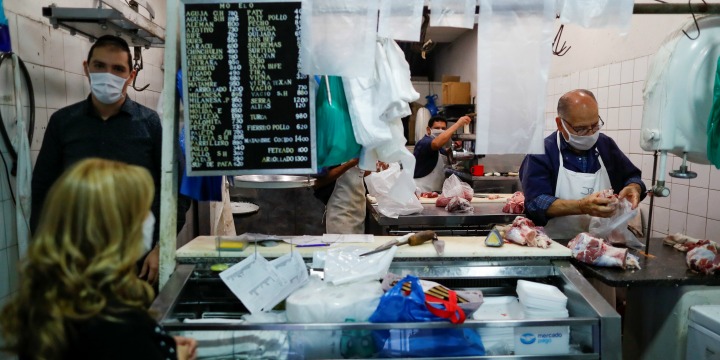Argentina Plans to Fly in Rabbis to Certify Kosher Meat, Despite Closed Borders
 by Reuters and Algemeiner Staff
by Reuters and Algemeiner Staff

A butcher chops meat at a kosher butcher shop, in Buenos Aires, Argentina, May 20, 2020. Photo: Reuters / Agustin Marcarian.
Argentina, which has enforced one of the world’s toughest travel bans against the coronavirus, plans to help charter a private flight to bring in rabbis from Israel to certify meat at the country’s packing plants for kosher markets around the world.
The trip is key to Argentina being able to maintain beef exports to key buyer Israel, which has become increasingly important with exports stalled to the European Union and sharply down to major buyer China.
The global lockdown meant to slow the spread of the novel coronavirus has snarled this year’s plans with borders closed and air travel paralyzed worldwide.
“The only alternative has been to be able to try to arrange a charter in combination with Israeli clients, and supervised, authorized and coordinated by the governments,” said Mario Ravettino, head of Argentina‘s ABC meat export consortium.
Argentina is the world’s fifth-largest beef exporter and Israel is the No. 3 buyer of its famed cuts, snapping up over $100 million each year, Ravettino said.
The rabbis normally make the trip twice a year and stay for a few months, as many as 15 rabbis in plants at a time. They ensure the cattle are slaughtered and the meat processed in accordance with Jewish law.
An Argentine Foreign Ministry spokesman confirmed the government was helping to make arrangements for the rabbis. He did not say when they would arrive.
Argentina has banned commercial flights until September, allowing only citizens and residents to enter on special flights and has imposed a strict national quarantine.
Rabbi David Faour, owner of South America Kosher (SAK), a local company certifying kosher production, said the rabbis were needed for lack of people locally who could certify the meat was kosher, a word derived from the Hebrew word meaning fit to eat.
 Police Stop Anti-Zionist Agitators From Accessing Florida University President’s Home as Students Revolt Nationwide
Police Stop Anti-Zionist Agitators From Accessing Florida University President’s Home as Students Revolt Nationwide Nearly One in Five Young People Sympathize With Hamas, 29% Say US Should Reduce or End Alliance With Israel: Poll
Nearly One in Five Young People Sympathize With Hamas, 29% Say US Should Reduce or End Alliance With Israel: Poll Ilhan Omar Silent After Daughter’s Arrest, Suspension for Role in Columbia University Anti-Israel Protest
Ilhan Omar Silent After Daughter’s Arrest, Suspension for Role in Columbia University Anti-Israel Protest Cultural Center Backed by Iran’s Revolutionary Guard Plans to Produce Films About Attack on Israel
Cultural Center Backed by Iran’s Revolutionary Guard Plans to Produce Films About Attack on Israel How Does Ilhan Omar Really Feel About Iran?
How Does Ilhan Omar Really Feel About Iran? This Passover, Combine Respect for Tradition with the Courage to Innovate
This Passover, Combine Respect for Tradition with the Courage to Innovate Israel’s Iran Attack Carefully Calibrated After Internal Splits, US Pressure
Israel’s Iran Attack Carefully Calibrated After Internal Splits, US Pressure Palestinian Cameramen Exposed in New Footage Documenting Oct. 7 Atrocities Side by Side with Terrorists
Palestinian Cameramen Exposed in New Footage Documenting Oct. 7 Atrocities Side by Side with Terrorists US Money to Convicted Terrorists; US Training to Aspiring Terrorists
US Money to Convicted Terrorists; US Training to Aspiring Terrorists Man Arrested in Paris After Iran Consulate Incident
Man Arrested in Paris After Iran Consulate Incident



 Palestinian Cameramen Exposed in New Footage Documenting Oct. 7 Atrocities Side by Side with Terrorists
Palestinian Cameramen Exposed in New Footage Documenting Oct. 7 Atrocities Side by Side with Terrorists Israel’s Iran Attack Carefully Calibrated After Internal Splits, US Pressure
Israel’s Iran Attack Carefully Calibrated After Internal Splits, US Pressure This Passover, Combine Respect for Tradition with the Courage to Innovate
This Passover, Combine Respect for Tradition with the Courage to Innovate How Does Ilhan Omar Really Feel About Iran?
How Does Ilhan Omar Really Feel About Iran? Cultural Center Backed by Iran’s Revolutionary Guard Plans to Produce Films About Attack on Israel
Cultural Center Backed by Iran’s Revolutionary Guard Plans to Produce Films About Attack on Israel